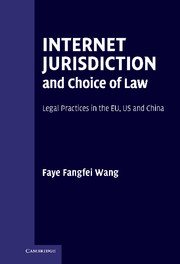Book contents
- Frontmatter
- Contents
- Preface
- List of Abbreviations
- Table of Cases
- PART I Introduction
- PART II Jurisdiction
- 2 Jurisdiction in electronic contracting
- 3 EU rules applied in cyber jurisdiction
- 4 US jurisdiction tests employed in e-contracting disputes
- 5 Chinese legislation on jurisdiction
- PART III Choice of law
- PART IV Online dispute resolution
- PART V The future
- Appendix 1 Council Regulation (EC) No 44/2001 of 22 December 2000 on jurisdiction and the recognition and enforcement of judgments in civil and commercial matters (Brussels I)
- Appendix 2 Regulation (EC) No 593/2008 of the European Parliament and of the Council of 17 June 2008 on the law applicable to contractual obligations (Rome I)
- Bibliography
- Index
2 - Jurisdiction in electronic contracting
from PART II - Jurisdiction
Published online by Cambridge University Press: 03 May 2011
- Frontmatter
- Contents
- Preface
- List of Abbreviations
- Table of Cases
- PART I Introduction
- PART II Jurisdiction
- 2 Jurisdiction in electronic contracting
- 3 EU rules applied in cyber jurisdiction
- 4 US jurisdiction tests employed in e-contracting disputes
- 5 Chinese legislation on jurisdiction
- PART III Choice of law
- PART IV Online dispute resolution
- PART V The future
- Appendix 1 Council Regulation (EC) No 44/2001 of 22 December 2000 on jurisdiction and the recognition and enforcement of judgments in civil and commercial matters (Brussels I)
- Appendix 2 Regulation (EC) No 593/2008 of the European Parliament and of the Council of 17 June 2008 on the law applicable to contractual obligations (Rome I)
- Bibliography
- Index
Summary
Overview of jurisdiction
When commercial transactions are conducted over the Internet rather than in the physical market place, travel or transportation seems to be irrelevant, so the foreign location where transactions might take place will not become a difficult factor for sellers and buyers. On the Internet, merchants can order goods from different countries without a physical visit, while consumers can also buy personal products from foreign sellers at home. The process of international trade and business becomes much simpler than before so that the number of cross-border transactions is continually increasing. Cross-border disputes in electronic commercial transactions are much more frequent and more complicated to deal with than those in the paper-based environment as the location of transactions for determining hearing courts or applicable laws is very difficult to predict and ascertain. Often, online contracting is not executed in one particular place. Moreover, businesses fear that electronic contracts may not be enforceable in a court of law due to different legislation in different countries. Therefore, issues of private international law arise.
Definitions and principles
Jurisdiction means the geographic area of the legal authority (i.e. courts) that will have powers to hear and judge cases. International jurisdiction issues occur when a dispute is international. “International” means the contracting parties are of different nationalities or do not reside in the same country. Sometimes, it also refers to situations where the subject matter of the disputes has a foreign aspect.
- Type
- Chapter
- Information
- Internet Jurisdiction and Choice of LawLegal Practices in the EU, US and China, pp. 17 - 34Publisher: Cambridge University PressPrint publication year: 2010



